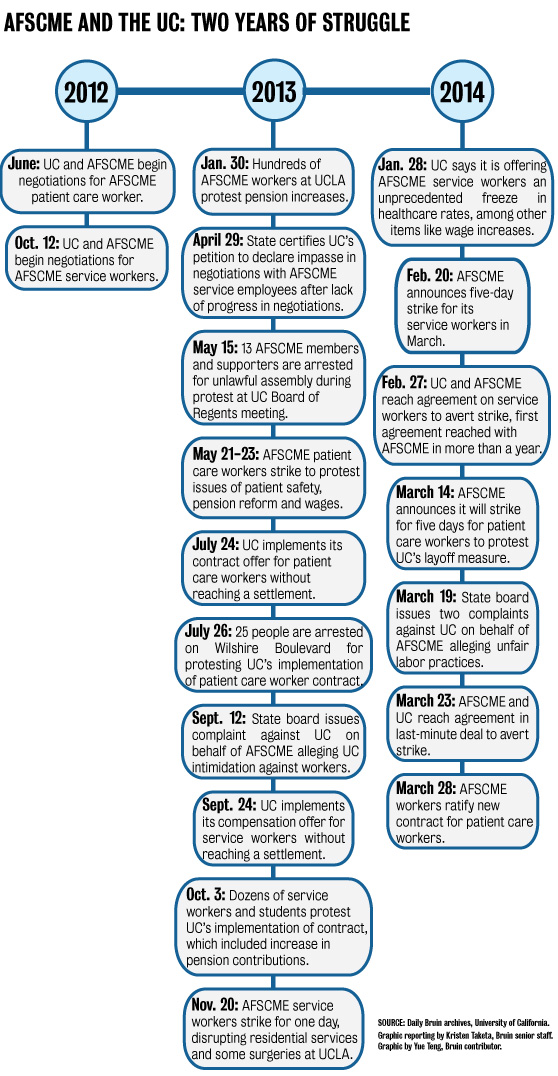UC comes to terms with AFSCME after nearly two years of negotiations

By Kristen Taketa
March 31, 2014 1:55 a.m.
The University of California and its largest union finally reached the end of nearly two years of unusually long and difficult collective bargaining negotiations.
The American Federation of State, County and Municipal Employees 3299 union reached an agreement with the UC Sunday on a contract for its about 13,000 patient care workers, averting a five-day strike that would have occurred at the UC’s hospitals. The union notified the UC on Friday that its members voted to accept the contract. Weeks earlier, the two parties reached an agreement over AFSCME’s about 8,300 service workers that also averted another planned five-day strike.
“With this ratified agreement, we’ve taken an important step to improving staffing and safety levels at UC hospitals,” said Todd Stenhouse, AFSCME 3299 spokesman. “It’s unfortunate that it took so long to get there, but I think the agreement shows the importance of good faith compromise.”
Since the two parties began negotiating contracts for AFSCME’s patient care and service workers in late 2012, relations between the two were characterized by distrust and disagreement. They have fought over how high AFSCME’s wagesshould be, whether the UC was staffing its hospitals at safe enough levels, how the UC increased pension contributions for all its employees last year and whether the UC committed unfair labor practices, as AFSCME claimed.
AFSCME has claimed the University did not bargain in good faith and was not paying its workers enough, since it said many of its workers qualify for welfare. The University has said the union threatens hospital safety with its strikes and that the union was asking for special treatment compared to other unions. Both sides said the other misrepresented what the central issue at hand was and both claimed the other was responsible for unnecessarily prolonging contract negotiations.
University officials have said AFSCME is singular in character and its tactics unusual among all its unions, calling it an “outlier” compared to other unions.
For instance, negotiations between AFSCME and the UC took several months longer than it did for other unions that reached agreements similar to AFSCME’s. It took eight months for the UC to finalize a contract with a union representing UC nurses and 12 for a union representing research and technical employees. For AFSCME, it took 17 months to reach agreement over its service workers and 21 to reach agreement over its patient care employees.
Also, no other single UC union in recent times has gone on strike or threatened a strike as many times in a year as AFSCME. AFSCME went on two strikes and threatened two more to protest alleged unfair labor practices it said the UC committed, including trying to impose an “emergency layoff” measure and intimidating its workers as they prepared to go on strike, claims the University denied.
“We are disappointed that this process took as long as it did and became so contentious,” said Dwaine Duckett, vice president of UC human resource in a statement released Friday. “These (other) contracts were achieved in less time and with significantly less stress and uncertainty for workers at our hospitals.”
Relations between AFSCME and the UC reached a turning point, however, when they suddenly announced an agreement over AFSCME’s service workers just a few days before AFSCME was set to strike for five days. The UC gave AFSCME an unprecedented freeze in healthcare rates and wage increases higher than what other UC employees had received, among other measures. The agreement averted AFSCME’s planned strike, which would have cost the UC $50 million over five days and disrupted surgeries and other operations at UC hospitals.
“The agreement also allows our medical centers and student health centers to continue to deliver the quality care our patients and students depend on without any interruptions,” Duckett said in the statement.
Leaders from other unions who went through their own contract negotiations with the University said they have noticed a difference in attitude between negotiating with former UC President Mark Yudof’s administration and with current President Janet Napolitano’s administration. The change in attitude may have led to easier bargaining between two parties and a greater willingness for compromise, they said.
Since Napolitano took office at the end of September last year, the UC has reached contract agreements with nine out of the University’s 13 major labor units.
“President Napolitano is at least somebody we can speak to. We may not agree with her, but we can speak to her,” said Jelger Kalmijn, president of United Professional and Technical Employees Communication Workers of America 9119, which represents licensed health care professionals and research and technical employees.
Joe Lindsay, a communications director for California Nurses Association, which ratified its own contract in November, said the personnel for the bargaining team did not change but he thought the University was more willing to reach an agreement with Napolitano in charge.
They also added they believe strikes are an effective tool to persuade the University to start compromising.
“The ultimate weapon for the worker is to refuse to work, to refuse to allow employers to make profits from the labor,” Lindsay said.
AFSCME’s two new contracts will last for four years. The University is currently negotiating only two more contracts – one for academic student workers and one for physicians, dentists and podiatrists, a recently formed union. The UAW Local 2865 union, which represents about 12,000 academic student employees including teaching assistants, is set to strike for two days at UC campuses later this week to protest large class section sizes. There has not yet been an announcement that the strike is called off.


